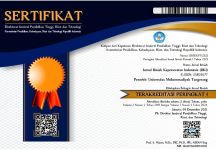Telenursing Development of N-SMSI (Short Message Service Intervention) in the care of post-treatment TB patients in hospitals
Abstract
Tuberculosis (TB) is still a deadly infectious disease in the community. TB patient’s compliance in the consumption of Anti-TB drugs for 6 months, determine the recovery of TB patients. The outpatients TB is most likely to experience a drug dropout which can lead to Multi Drug Resistance Tuberculosis (MDR-TB), so that Supervisors Take Medication are needed to prevent the occurrence of MDR-TB. Ners-Short Message Service Intervention (N-SMSI) is one of the information systems that can developed to prevent the occurrence of MDR-TB. The purpose of writing this article is to describe and analyze the development of N-SMSI telenursing as an information system for conducting observations in the care of TB patients who can help TB patients achieve recovery in a way that effective and efficient. The method in writing this article is the study of literature using a variety of literature related to the application of N-SMSI especially in the prevention of MDR-TB. The results of the literature study show that N-SMSI can be utilized in monitoring patient compliance in consuming OAT, so that expectations cured patients is very large and the mortality rate in TB cases can be suppressed as much as possible. This literature recommends the application of N-SMSI in outpatient TB patients to facilitate activities monitoring by health workers in the prevention of MDR-TB.
Keywords: MDR-TB, N-SMS, Telenursing, Tuberculosis
Full Text:
Anggana_PDFReferences
Acker, A. (2014). The short message service: standards, infrastructure and innovation. Los Angeles: Elsevier. https://doi.org/10.1016/j.tele.2014.01.004
Bediang, G., Stoll, B., Elia, N., Abena J.L., Nolna, D., Chastonay, P., Geissbuhler, A. (2014). SMS reminders to improve the Tuberculosis cure rate in developing countries (TB-SMS Cameroon): A protocol of randomized control study. Biomed Central, 15(35), 1-9.
College of Registered Nurses of Nova Scotia. (2017). Practice guidelines: Telenursing. Kanada: College of Registered Nurses of Nova Scotia.
Fang, X.H., Guan, S.Y., Tang, L., Tao, F.B., Zou, Z., Wang, J.X., …. Pan, H.F. (2017). Effect of short message service on management of pulmonary Tuberculosis patients in Anhui Province, China: A prospective, randomized controlled study. Medical Science Monitor, 23, 2465-2469.
https://doi.org/10.12659/MSM.904957
Fox, G. J. & Menzies, D. (2013). The new paradigm of immunity to tuberculosis: epidemiology of tuberculosis immunology. New York: Springer. ISBN 978-1-4614-6111-1
Has, Eka M. M., Ulfiana, E., Efendi, F., Indarwati, R., Haryanto, J., Makhfudli. (2015). Model manejemen perawatan untuk meningkatkan kepatuhan minum obat dan status gizi pasien TB paru. Vol. 10 No. 1 Hal. 189-193. Surabaya: Jurnal Ners Universitas Airlangga.
Hermans, S.M., Elbireer, S., Tibakabikoba, H., Hoefman, B.J., Manabe, Y.C. (2017). Text messaging to decrease Tuberculosis treatment attrition in TB-HIV coinfection in Uganda. Patient Preference and Adherence, 11, 1479-1487.
Johnston, J.C., Kop, M.L.V.D., Smillie, K., Ogilvie, G., Marra, F., Sadatsafavi, M., ... Lester, R.T. (2018). The effect of text messaging on latent Tuberculosis treatment adherence: A randomized controlled trial. European Respiratory Society, 51, 1-10.
https://doi.org/10.1183/13993003.01488-2017
Kementrian Kesehatan RI. (2016). Peraturan menteri kesehatan Republik Indonesia No. 67 Tahun 2016 tentang Penanggulangan Tuberkulosis. Jakarta: Kemenkes RI.
Kementerian Kesehatan RI. (2014). Peraturan pemerintah Republik Indonesia nomor 46 tahun 2014 tentang sistem informasi kesehatan. Jakarta: Kemenkes RI.
Kumar, S. (2016). Telenursing. New York: Springer London Dordrecht Heidelberg.
Lamprinakos, G.C. Asanin, S. Broden, T. Prestileo, A. Fursse, J. Papadopoulos, K.A. Kaklamani, D.I. Venieris, I.S. (2015). An integrated remote monitoring platform towards telehealth and telecare services interoperability. Athens: Elsevier.
https://doi.org/10.1016/j.ins.2015.02.032
Lester, R., Park, J.J.H., Bolten, L.M., Enjetti, A., Johnston, J.C., Schwartzman, K., ... Delft, A.V. (2019). Mobile phone short service for adherence support and care of patients with tuberculosis infection: Evidence and opportunity. Journal of Clinical Tuberculosis and Other Mycobacterial Diseases, 16, 1-9.
https://doi.org/10.1016/j.jctube.2019.100108
Meyer, A.J., Babirye, D., Armstrong-Hough, M., Mark, D., Ayakaka, I., Katamba, A., Haberer, J.E., Davis, J.L. (2018). Text messages sent to household Tuberculosis contacts in Kampala, Uganda: process evaluation. JMIR Mhealth Uhealth, 6(11), 1-11.
https://doi.org/10.2196/10239
Pangan, K. I., Pangilinan, Gianne A., Pangilinan, Milcah., Pangilinan, Recah., Pangilinan, Romina., Par, Carl J., Paragas. E. (2011). Telenursing through sms (short messaging service): it’s effect on knowledge and adherence. Hal. 115 – 120. Manila: International Journal of Public Health Research Special Issue 2011. http://www.who.int/tb/publications/factsheet_global.pdf
DOI: http://dx.doi.org/10.31000/jiki.v3i1.2058
Article Metrics
Abstract - 1659 Anggana_PDF - 4814DOI (Anggana_PDF): http://dx.doi.org/10.31000/jiki.v3i1.2058.g1616
Refbacks
- There are currently no refbacks.
Copyright (c) 2020 Jurnal Ilmiah Keperawatan Indonesia (JIKI)
JIKI: Jurnal Ilmiah Keperawatan Indonesia a Creative Commons Attribution-ShareAlike 4.0 International License. © View My Stats







